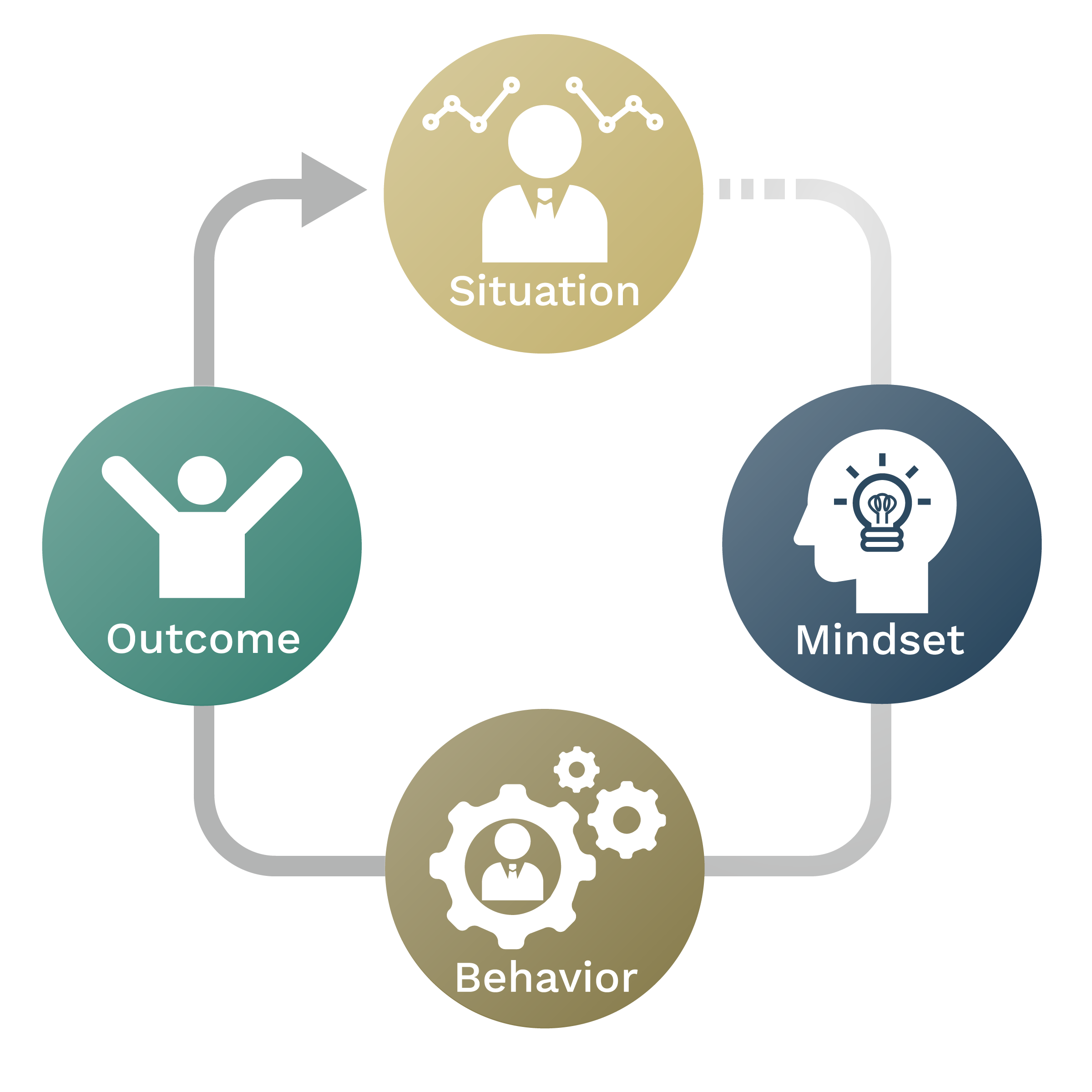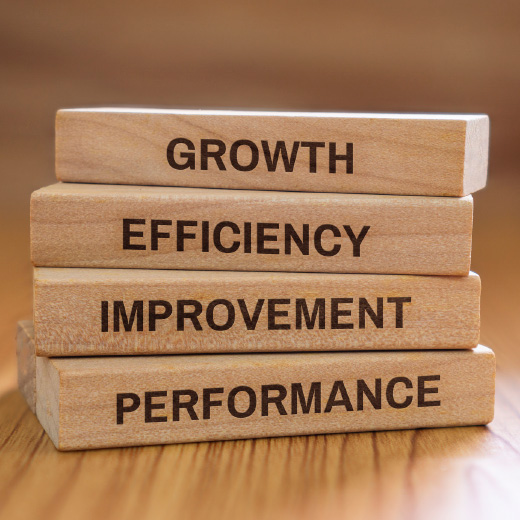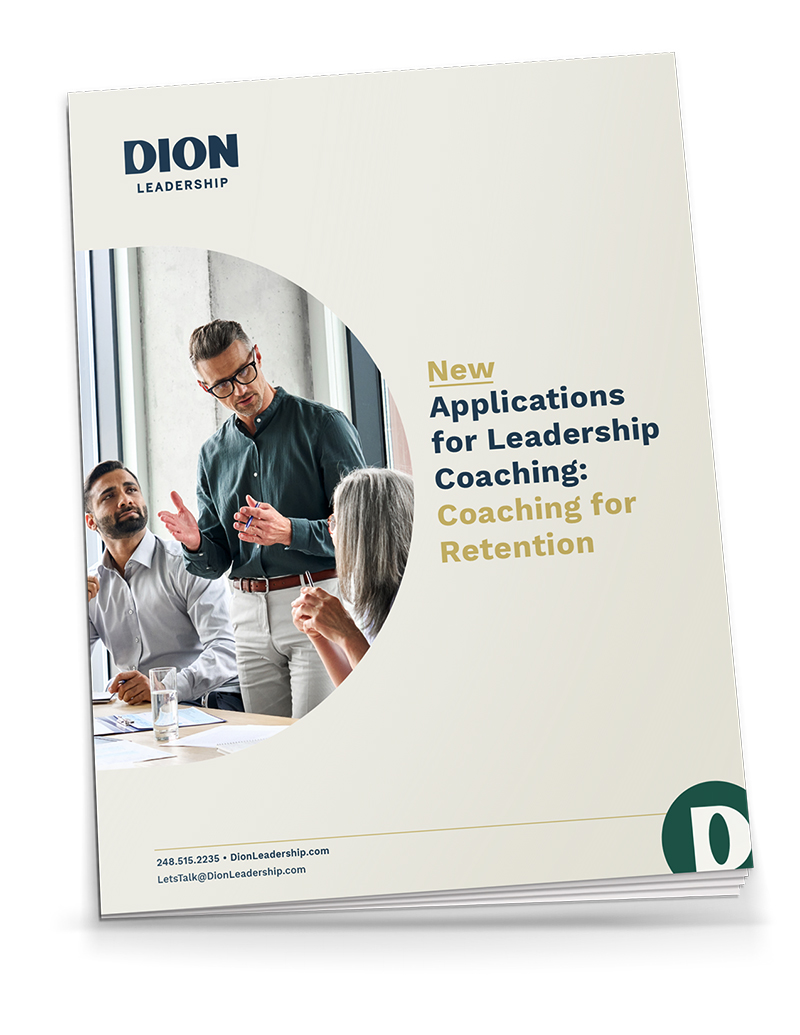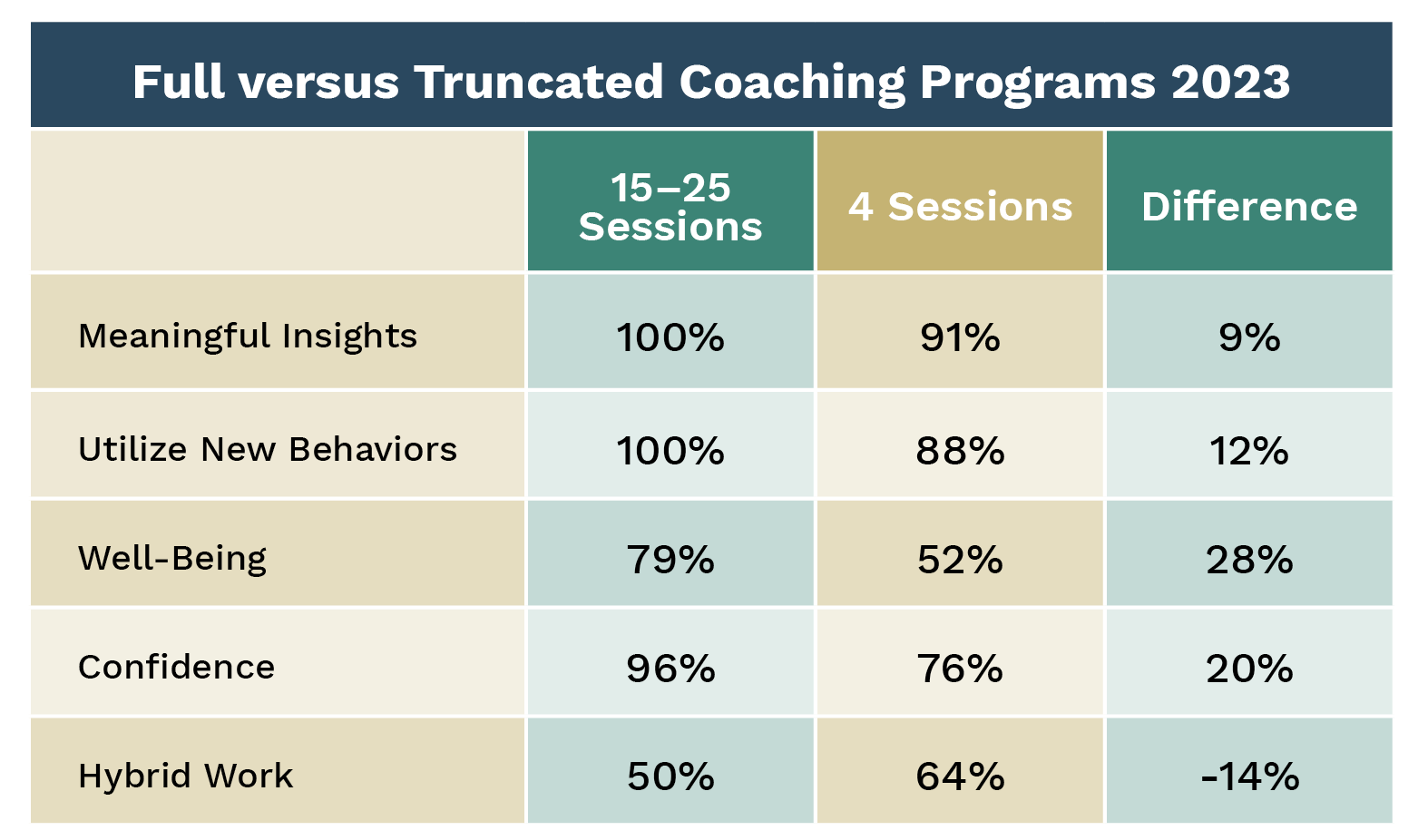COACHING RESEARCH STUDY
Leadership Coaching Effectiveness 2023
Results from an Annual Research Study Reporting on the Impact of Leadership Coaching
Introduction
Organizations have weathered a phenomenal amount of change and complexity this past year. Talent shortages, heightened employee expectations, new managers, and changing business models have put a great amount of pressure on leaders. On top of this, we are still figuring out how to work in hybrid and remote work environments.
Leading organizations and the people within them can be difficult, complicated work. Leadership coaching has proven to be a effective development application for supporting today’s pressured leaders.
As a global leadership and organizational development consulting firm that is passionate about creating organizations where employees start every day excited and end every day accomplished, we are always curious and interested in learning more about the impact our leadership programs have on individual, team, and organizational performance. That’s why we conduct an annual coaching effectiveness survey. This pursuit of meaningful coaching insights and data is now in its fourth year.
Earlier this fall we once again invited a large cadre of leaders to consider the impact coaching had on their performance, confidence, well-being, and intention to stay with their organization. We also added some new questions designed to measure career progression, including promotions and job changes. We hope you find these results valuable in developing or modifying your organization’s leadership coaching program.

Study Details
- We surveyed 100 participants who completed coaching engagments after January 2022 and received 57 responses.
- Those surveyed typically hold the title of manager, director, vice president, or C-level executive.
- Participants represent multiple industries (several from large manufacturing and healthcare organizations) and hold a variety of jobs.
- Participants received between 4 and 25 individual coaching sessions that spanned in length from 3 to 12 months, either as a stand-alone program or as part of a comprehensive leadership development cohort program.
In this report, we explore the feedback from completed coaching programs and how the results have changed or remained the same over three years. Additionally, we include a selection of the respondents’ open-ended comments, categorized and shown verbatim, to offer meaningful insights into when to use leadership coaching and the results of these engagements.
What Is Leadership Coaching?
Leadership coaching is a targeted leadership development process designed to meet the unique needs of the individual leader. A leadership coach is a “thinking partner” whose specific purpose is to support the development of an individual’s personal and professional potential.
To create sustainable change, we follow a cognitive behavioral learning approach to coaching. This proven method helps a coachee explore situations with a new perspective, understand themselves in a new way, create new mindsets for approaching situations, and build new and more productive habits.
Our leadership coaches are typically previous executive-level leaders themselves. They have honed their leadership skills with decades of experience before receiving a coaching certification. We select coaches who have strong emotional intelligence skills as a complement to their business and leadership aptitude and experience.
Our coaches use a proven coaching process. A key element that makes our coaching engagements so successful is our coach match process. We encourage all coachees to conduct “chemistry calls” before selecting the coach they find most credible.


The Results
Coaching Consistently Improves Performance
Nearly all respondents agreed or strongly agreed with the following statements.
Leadership coaching provided me insights which helped me perform better in my role.
- 2023 – Agree or Strongly Agree 95%
- 2022 – Agree or Strongly Agree 95%
- 2021 – Agree or Strongly Agree 97%
- 2020 – Agree or Strongly Agree 83%
As a result of my leadership coaching,
I am better equipped to utilize new behaviors required of me at work.
- 2023 – Agree or Strongly Agree 93%
- 2022 – Agree or Strongly Agree 95%
- 2021 – Agree or Strongly Agree 97%
- 2020 – Agree or Strongly Agree 93%
The process of vetting leaders who want coaching, allowing them to select a coach they find credible and fitting for their situation, and having skilled, certified leadership coaches that follow a process contributes to reliably strong results.
While the results may differ by a point or two from year to year, from a big picture perspective, nine out of ten coachees consistently report that coaching gave them valuable insights and new behaviors to perform better at work!
94.4%
Overall Satisfaction
We asked participants how likely they are to recommend leadership coaching to others. Presented with a ten-point scale with one being “not at all” and ten being “extremely likely,” 94.4% of respondents chose ratings between seven and ten.
84%
We Can All Benefit from a Confidence Boost
We found that 84% of coachees said that coaching improved their confidence.
- Are your leaders prepared to have a courageous conversations?
- Are they ready to share a controversial point of view?
- Are they equipped to be agile in the face of adversity?

“I’m more confident and able to understand other styles of leadership.”
– Coachee
Well-Being Still Matters
63%
My overall well-being (stress, health, focus, burnout) has improved because
of leadership coaching.
Over the last few years, much has been written about employees’ search for well-being and strategies to prevent burnout and stress. Employees leaving organizations or changing careers in search of more balance and personal satisfaction upended talent pipelines.
Nearly two out of three coachees report improvements in their own well-being as a result of leadership coaching.
Top Talent Retention
64%
Leadership coaching positively impacted my desire to stay with the organization.
Retaining top talent is one of the most important priorities for organizations.
Leaders continue to be enticed to change jobs with offers of pay increases, alternative work arrangements, and a promise of a more manageable workload. Can coaching serve as an effective retention tool?
Keeping just one key leader from leaving the organization can create a positive ROI for your entire leadership development budget. After analyzing the open-ended comments, we found a connection between the desire to stay with the organization and the following coaching strategies:
- The investment in time and money alone signals to the leader that the organization values them.
- Our coaching process focuses on improving the communication channels between the coachee and their leader, leading to increased clarity of job expectations.
- Coaching helps the coachee realize the role their own thinking and behavior play with struggles, challenges, and setbacks at work. Looking at situations from the viewpoint of others, unhooking from a typical victim mindset, and being proactive when something is not going their way helps the coachee regain engagement and commitment to the organization.
“Prior to the coaching sessions…
I had disengaged as an employee. Coaching helped me to re-engage with the organization restoring the benefits of my long tenure and extensive cross-functional experience.”
– Coachee

Coaching for a Stronger Talent Pipeline
A new focus area for this study is analyzing the changes in the coachee’s job. While not all employees enter coaching to get a promotion, growing with an organization is a mutual benefit for the employee and the organization.
1 in 4 Coachees Promoted
An additional interesting and surprising result was that one-third of the participants changed aspects of their job to better fit their interests. We suspect that having a role that is more personally satisfying positively affects the coachee’s retention with the organization.
- I have been promoted. 24.25%
- I have increased responsibilities. 21.21%
- I have been able to change aspects of my job to better fit my interests. 33.33%
- There has been no change in my role. 21.21%
Coaching for Retention
We recently developed a coaching for retention model that helped leaders focus on finding what they needed to stay with their current organization. Partnering with clients to utilize this coaching-for-retention approach rather than the traditional performance improvement focus, we created thought leadership white papers, blogs, and webinars on the topic.
If leader retention is important to you and your organization, check out these additional resources for ways to incorporate retention coaching into your strategy.

e-Book
Blog
Webinar
What’s Working with Hybrid Work
We began exploring if and how coaching is used to support working and leading in a hybrid work environment in 2021. At that time, this was a new and challenging work situation. Since then, working anywhere has become more of a mainstay at organizations.
We were curious to understand if coachees used their coaching program to focus on working and leading in a newly remote or hybrid work environment. If so, what was the result from focusing their development in this area?
We found that 58% of respondents used leadership coaching to help them be more effective working and leading in a newly remote/hybrid work environment.
58%
We found that 58% of respondents used leadership coaching to help them be more effective working and leading in a newly remote/hybrid work environment.
The Power of Extraordinary Coaches
We asked respondents to provide any additional feedback on their specific coach. The comments on these pages illustrate the deep connection, admiration, and impact the coach had on the coachee.
“My coach, Monique, was highly skilled and provided the exact type of kind, direct feedback I was seeking.”
“Mary Beth is a very good listener, incredibly insightful, asks great questions, and encourages me to think.”
“Jim made me feel comfortable talking about my challenges and blinders. His feedback played a role in my development planning.”
“MaryAnn was amazing! She supported and challenged me in so many ways which helped me grow personally and professionally!”
“Debra is extraordinary coach with strategic insights and strategies that have accelerated my professional development.”
“Jennifer was amazing! I highly recommend her. She had a very kind way to dig deeper when needed which led to a lot of ‘light bulb moments.’”
“La Wanda was wonderful. She was professional but approachable and made the sessions a safe space for me to feel comfortable to speak freely about my professional development.”
“Gale is an amazing coach. With her coaching, I am now more confident, more effective, and a stronger leader. I am also able to better care for myself.”
“Kelly was superb. Easy to connect with and tailored her approach to my situation.”
What Are You Working On?
An initial and important step in every coaching program is the development of a coaching action plan and securing agreement on that plan from the coachee’s leader. Selecting items that will improve the coachee’s overall performance is critical. Informed by self and multi-rater data, the action plan creates focus for future coaching sessions. This year’s results do not vary much from last year. We categorized the results into two tiers. In the chart below, tier one coaching action plan items were shared by 30–50% of all the respondents. Tier two are action items shared by 20–25% of the respondents.
Tier 1 Actions 30-50% of Respondents
- Improving my ability to communicate/listen
- Managing up/executive presence
- Thinking strategically/long-term planning
- Effectively leading and managing others
Tier 2 Actions 20-25% of Respondents
- Increasing my emotional intelligence
- Managing change
- Effectively managing my time/consistently executing work
- Managing conflict
- Building relationships/interpersonal effectiveness
Improving communication topped the list again this year. Emotional intelligence moved up slightly on the list. Managing change did not appear on the list last year.
In 2020, when the pandemic hit, 83% of the respondents used coaching to help determine how to focus on the most important work. While this is not as needed today, year over year, the need to improve on communication, executive presence, strategic thinking, and leading others are constants.
83%
One Size Does Not Fit All
Most coaching firms have a variety of coaching packages to fit each learner’s unique needs and each organization’s budget. At Dion Leadership we offer three distinct coaching programs, whose participants were included in this study.
- Comprehensive Leadership Coaching Program—A coach works with their coachee for a year through a series of approximately 25 coaching sessions.
- Targeted Leadership Coaching Program—Shorter engagements are offered for more targeted coaching needs. These programs last between four and six months.
- Leadership Development Program Enhancement—We also offer individual coaching as part of a broader leadership development program. In this case, learners receive four individual coaching sessions dispersed around a series of full-day leadership training workshops.
When measuring coaching effectiveness, we found that those who received full leadership coaching reported much stronger coaching results. The chart shows the notable difference.
Typically, those learners receiving coaching as part of a leadership program are also at a more junior level in the organization—typically manager or director level—than those receiving year-long comprehensive coaching.
75%
58%
We expected to see that longer coaching programs provide greater impact. But how much? And in what areas? One notable area is retention: 75% of full coaching program respondents said coaching positively impacted their desire to stay with the organization. We found that more than half – 58% of coachees in the four-session program reported that coaching affected their desire to stay.
The chart below outlines the differences between those in a four-session coaching program and all others. While the impact is not as great, even four sessions provide meaningful results.

Does Coaching Vary by Industry?
We analyzed this year’s data set to see if coaching focus areas, the coaching process, the results, and specific comments about coaching varied by industry. With enough data to look for trends between manufacturing and healthcare, we analyzed the results carefully.
We found that leaders in multiple industries are similar, with common needs, struggles, and work situations. Whether you are a clinical leader in a hospital setting or a plant manufacturing manager, you share common development needs.
Some shared focus areas:
- Strategic thinking
- Communication
- Building relationship and interpersonal effectiveness
One item specific to healthcare was the desire to focus on managing up and executive presence.
Several respondents shared that coaching helped them to be a more effective hybrid worker and leader, and it improved overall well-being (stress, health, focus, and burnout).
91%
75%
Last, the reported change in confidence varied greatly by industry. 91% of the respondents in the manufacturing industry agreed or strongly agreed that coaching helped them improve their confidence, compared to 75% in healthcare.
Coaching focus areas slightly varied by industry: We found that healthcare executives focused more on improving communication, building relationships/interpersonal effectiveness, and managing up/executive presence during coaching. By contrast, manufacturing executives focused on increasing their emotional intelligence, effectively leading and managing others, and managing conflict.
In Their Own Words . . .
Perhaps the most useful insights from this study lie in the written responses to the simple prompt: Describe how your organization benefited from providing you with leadership coaching. The comments below were sourced directly from the survey responses and sorted by category.
Management
- I was able to implement the insights shared during our time together with my management role. Instead of telling someone how I would handle a situation, I learned how to coach them into discovering how they could handle it in their own style and remain authentic to themselves.
- My coach and I began working together in the middle of the pandemic. As a new CNO her insights were extremely valuable for me and gave me tangible tools to use to manage the stress and burnout among my leadership team.
- The practiced skills of persuasion and organizational effectiveness helped skill me up for another leadership position. Effective delegation within my team helped to make me a more effective leader for my position.
- Thanks to coaching, I can now work with more focus on the strategic aspects to help grow my organization. For example, I delegate more; in this way I gain more time for my activities and in
parallel I help my team to gain confidence, demonstrate accountability and eventually develop for future higher levels in the organization - By having better tools and self-reflection on ways we can do different and lead better. Managing sensitive/stressful situations at work with employees, for instance.
- The leadership coaching provided advice on management methods that are very effective even for a novice leader of an organization. We can further contribute to the organization by using the experience in the future.
- I am more aware of myself and my surroundings and am more deliberate and specific in how I manage my team and my leadership to be more successful.
Communication
- Coach helped me to analyze next steps and receive feedback from direct reports on “what’s next” in the organization.
- I believe that I am more understanding and open-minded than before. I also listen more and actively try to understand different perspectives.
- Coach reviewed my talent portfolio, helped me to explore specific strengths (writing and public speaking), and as an unexpected bonus, provided guidance to me for an issue I encountered within my division because he was available for counsel.
- I am able to articulate clear strategic plans and expectations of the team in the execution phase.
- Through my coach, I was able to change my perspective and approach when working with executives and cross-functional teams. Faster and clearer communication that aligns the organization to march towards a common goal.
- The coaching has helped me change my responses to some situations that have reduced the burden on others. I have expressed and raised new ideas that have helped shape department direction.
- My organization relies on leaders to pass on communication to those who report directly to them. Since coaching, I started sharing emails/announcements of new changes, required training, etc. directly to my team even if they were copied.
Leadership
- Improved my leadership skills and helped me be a more effective leader.
- Leadership coaching helped the organization by building up the next generation of regional executives—those professionals who will be in charge of ensuring near-future business continuity.
- I am better prepared to efficiently lead my team.
- Made me a stronger leader, more effective.
- Continued pressure on executive team to practice positive leadership skills to function higher as a team.
- It allowed me to see an alternative path to serve our patients and team members. I had not considered the options when I started coaching.
- I am a more effective and authentic leader.
Confidence
- I’m more confident and able to understand other styles of leadership.
- I believe that my decisions have become more assertive.
- Engagement and confidence in interacting with my new team helped me step into my new role quickly.
- I have since left the company, as I was pretty certain that the company was going to be sold. (I was correct.) However, before I left, the company benefitted from a reinvigorated, more self-aware and more courageous leader.
Relationship Development
- My company has benefitted from the leadership coaching I received because I have used some of the methods shared with me to develop relationships more quickly with my regional teams.
- It helps me to build trust among my team and create a collaborative and productive environment.
- I think our team’s biggest benefit was getting our team leadership together without our leaders in the room—to talk and get to know how to benefit from one another better—with some guidance to those discussions to not just be water cooler time.
- Most tangible benefit were the connections and conversations with my colleagues who were also involved in the coaching.
- I feel that the comradery among the leaders who attended has made a positive change. I feel more connected to the team and like we can understand each other’s differing views better.
- By being more connected with my peers, I have resources to help when I get stuck.
- The ability to interact with other leaders who we normally may not work with on a daily basis, and to provide peer coaching, helped to lay a foundation for a successful leadership team to lead our organization.
Results/Goal Attainment
- It allowed me to approach my work with intention and goals. Instead of being reactive to situations I was able to take a more proactive approach and it made me more effective in my position.
- It was an awesome experience to my colleagues and myself.
- Overall, the areas identified for improvement were not necessarily blind spots, but the coaching helped to develop a plan to actively work on some of my weaknesses while having a better insight of my strengths as well.
- Strategic insights and proactive professional development. Highly recommend.
- I was able to learn from an experienced, trusted leader, who came with years of experience in my current role. This allowed for her to share her own life lessons with me. I am able to lean on those examples when faced with day-to-day challenges.
Last Words
“Great experience to have someone from outside the organization look at your behaviors.”
“I wish that every leader would have the benefit of personalized coaching. The benefit is career changing.”
“I really enjoyed the ability to test and learn more about new processes and approaches that were outside of my comfort zone.”
“It helped me to clearly identify and understand my strengths and opportunities and gave me useful tools to develop those skills I need to pay attention to. Thanks for that!”
“My coach was able to help me understand things via a perspective that I would have not been able to understand without her professional insight. She pushed me hard to break through my tendencies and change my approaches for the better.”
Summing It Up
For four consecutive years, we have found that the overwhelming majority of coachees report specific and important behavior and mindset changes due to coaching. They report improved confidence and improved well-being. They consistently tell us that they are able to do their jobs better.
While there are minor variations each year, it’s clear that coaching benefits both the coachee and the organization.
Selecting the right people to participate in coaching and ensuring the right fit with a coach are key factors that determine program success.
To what extent is coaching worth the investment? In our tight labor market, retaining your top talent and keeping them engaged is a priceless investment.
As this study proves, coaching for retention delivers an impressive ROI. It generates promotions and improved job fit. It prompts new perspectives, greater confidence, and a renewed focus on creating and sustaining healthy workplace relationships that lead to improved organizational performance.
Leaders and managers have complex, challenging jobs. They are increasingly credited with the success or failure of sustaining a productive, engaged workforce. Supporting and developing these key employees is increasingly a priority for high-performing organizations.
Give the Gift of Coaching
If you would you like to learn more about creating or modifying a coaching program that supports your leaders and generates the benefits shown in this study, please reach out to us. Our experienced team of executive leadership coaches can help.

![]()
Steve Dion
Founder & CEO
Steve@DionLeadership.com
248-417-5895
